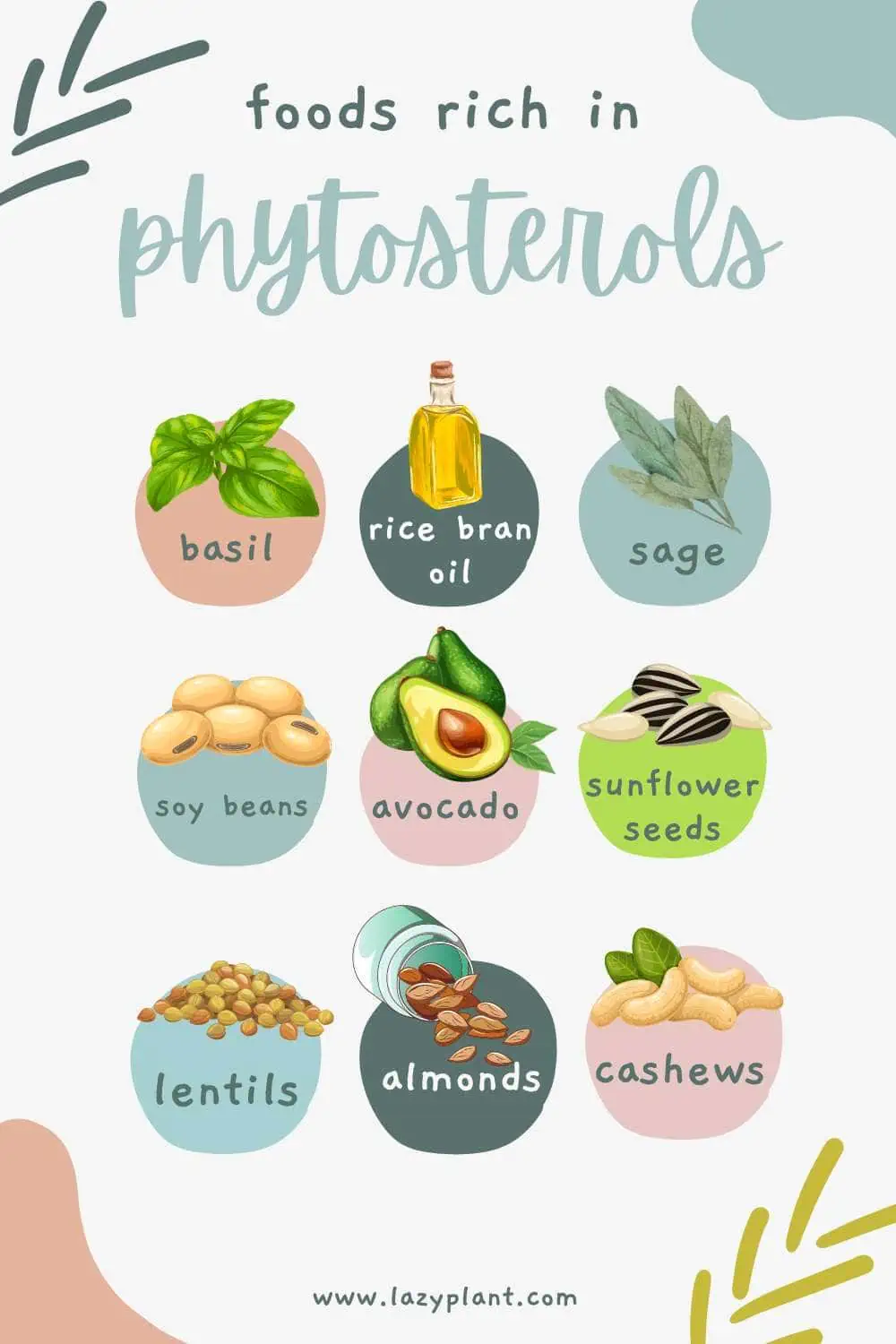Vegetable oils are the richest foods in phytosterols. Beans, whole grains, spices, seeds, nuts, fruits, and vegetables are also excellent dietary sources!
What are phytosterols?
Phytosterols are compounds naturally present only in plants. Foods from animal sources don’t contain any phytosterols.
Phytosterols are structurally related to cholesterol. There are 2 types of phytosterols; stanols and sterols. We can’t synthesize phytosterols. We have to get them from food.
What are the health benefits of phytosterols?
Above all, phytosterols can significantly lower serum LDL cholesterol. According to studies, a daily phytosterol dose of 2,000 mg can lower LDL cholesterol by up to 10%.[1]
Moreover, following a diet rich in phytosterols may be beneficial for people with cardiovascular disease or diabetes. Maintaining low levels of homocysteine is also important for your heart.
Additionally, phytosterols may lower the risk of certain cancers. But, further studies are needed.[2]
Which is the richest diet in phytosterols?
Nowadays, most people get 150-800 mg of phytosterols a day from their diet. Vegans and vegetarians consume the highest amounts.[3]
The average Western diet contains between 160-400 mg of phytosterols a day.
On the other hand, a plant-based diet contains 600-800 mg of phytosterols a day. A high-phytosterol plant-based diet contains up to 5 times more phytosterols than the average Western diet.
Although phytosterols are naturally present in many common foods, we absorb only a fraction of them. We absorb less than 5% of plant sterols and less than 0.5% of plant stanols!
In comparison, we absorb about 50%-60% of dietary cholesterol.
Hence, although diets typically contain similar amounts of phytosterols and cholesterol, our serum phytosterol concentrations are usually several hundred times lower than serum cholesterol concentrations!
How many phytosterols do we need per day?
Consuming high amounts of unrefined vegetable oils, vegetables, fruits, and nuts is enough to boost our daily intake of phytosterols
Our ancestors used to follow a diet rich in phytosterols, containing about 1,000 mg a day.
According to the National Cholesterol Education Program, a daily phytosterol intake of 2,000 mg is more than enough. We can get about 30% of this recommended dose from food. Especially if we follow a whole food plant-based diet.[3]
You can easily get an extra 400-1,000 mg of plant sterols from supplements. You’ll find a wide variety on iHerb; the largest platform for supplements and wellness products.

As a rule of thumb, we shouldn’t take more than 3,000 mg of phytosterols a day. Higher doses don’t have any further health benefits. On the contrary, pretty high doses of phytosterols from supplements might cause side effects.
Vegetable oils are the richest natural sources of phytosterols!
Unrefined vegetable oils contain the highest concentration of naturally occurring phytosterols! Just 1 tbsp of many common vegetable oils can boost your daily intake!
| phytosterols (mg per 100g) | phytosterols (mg per 1 tbsp) | |
| rice bran oil | 1,190 | 162 |
| sesame oil | 865 | 118 |
| canola oil | 807 | 113 |
| wheat germ oil | 553 | 75 |
| safflower oil | 444 | 60 |
| cottonseed oil | 324 | 44 |
| almond oil | 266 | 36 |
| hazelnut oil | 134-263 | 18-36 |
| soybean oil | 250 | 34 |
| olive oil | 221 | 30 |
| peanut oil | 207 | 28 |
| grapeseed oil | 180 | 24 |
| walnut oil | 176 | 24 |
| sunflower oil | 100 | 14 |
| coconut oil | 86 | 12 |
Common foods high in phytosterols
If you follow a whole-food, plant-based diet, you’ll get high doses of phytosterols:
- seeds and nuts are particularly high in phytosterols.
- whole grains contribute to the daily intake.
- beans are also excellent sources.
- fruits and vegetables contain decent amounts as well.
| seeds/nuts | mg | spices | mg | beans/fruits/greens | mg |
| sunflower seeds | 534 | sage | 244 | soybeans | 161 |
| pistachio nuts | 214 | paprika | 175 | kidney beans | 137 |
| cashews | 216 | thyme | 163 | fava beans | 124 |
| peanut butter | 157 | dill seed | 124 | avocado | 84 |
| almond butter | 139 | mustard seeds | 118 | lentils | 57 |
| macadamia nuts | 116 | basil | 106 | lettuce | 38 |
| almonds | 114 | cumin seed | 68 | beets | 25 |
| peanuts | 61-114 | cinnamon | 26 | asparagus | 24 |
| Brussels sprouts | 24 | ||||
| oranges | 24 | ||||
| potatoes | 20 | ||||
| onions | 18 | ||||
| cauliflower | 18 | ||||
| apricots | 18 | ||||
| grapefruit | 17 | ||||
| banana | 16 | ||||
| cucumber | 14 |